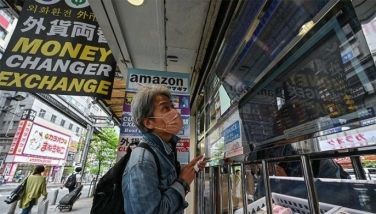Petron income jumps 84% to P1.24B
July 30, 2002 | 12:00am
Petron Corp. reported yesterday that its net income increased 84 percent to P1.24 billion in the first six months of 2002, from P673 million in the same period last year.
In the company’s annual stockholders’ meeting, Petron president Motassim Al-Ma’ashouq said the improvement in the firm’s bottomline could be attributed to the higher gross margins and the implementation of intensified cost management program.
Petron corporate communications manager Virginia Ruivivar said a slight increase in their export sales for the period boosted their earnings position.
For the first half of the year, the company was able to register export sales growth of 6.3 percent to 2.9 million barrels, from 2.7 million barrels in the comparative period in 2001.
"We have realized significant benefits from our relentless pursuit of value throughout our supply chain," Al-Ma’ashouq said, adding that the company would also continue on high growth segments in the fuel market and profitable non-fuel businesses that have natural links to its core business.
The Petron official said the company’s investment philosophy remains focused on maintaining market leadership. Bulk of the oil firm’s P1.5-billion investment program for 2002, he said, would be allocated for service station projects while the rest would go to various projects to improve operational efficiency.
The first semester net profit of the company already overshot its earnings for the whole of 2001 which was only P1.22 billion.
He said though short-term growth scenario in the country’s oil industry is still flat, the company remains bullish on the long-term prospects of the oil sector. "We are cautiously optimistic. I think crude prices may stay at current levels with exchange rate hopefully remaining at P50 level," he added.
Al-Ma’ashouq said they would continue improving the management cost and probably maintain the same level of effort in the future.
Though the company is confident that it could sustain the upturn in its finances, it said there are major challenges that the industry continues to face. These challenges include: sluggish domestic demand, strong competition, the remaining requirements of the Clean Air Act, and the Pandacan terminal issue.
In the company’s annual stockholders’ meeting, Petron president Motassim Al-Ma’ashouq said the improvement in the firm’s bottomline could be attributed to the higher gross margins and the implementation of intensified cost management program.
Petron corporate communications manager Virginia Ruivivar said a slight increase in their export sales for the period boosted their earnings position.
For the first half of the year, the company was able to register export sales growth of 6.3 percent to 2.9 million barrels, from 2.7 million barrels in the comparative period in 2001.
"We have realized significant benefits from our relentless pursuit of value throughout our supply chain," Al-Ma’ashouq said, adding that the company would also continue on high growth segments in the fuel market and profitable non-fuel businesses that have natural links to its core business.
The Petron official said the company’s investment philosophy remains focused on maintaining market leadership. Bulk of the oil firm’s P1.5-billion investment program for 2002, he said, would be allocated for service station projects while the rest would go to various projects to improve operational efficiency.
The first semester net profit of the company already overshot its earnings for the whole of 2001 which was only P1.22 billion.
He said though short-term growth scenario in the country’s oil industry is still flat, the company remains bullish on the long-term prospects of the oil sector. "We are cautiously optimistic. I think crude prices may stay at current levels with exchange rate hopefully remaining at P50 level," he added.
Al-Ma’ashouq said they would continue improving the management cost and probably maintain the same level of effort in the future.
Though the company is confident that it could sustain the upturn in its finances, it said there are major challenges that the industry continues to face. These challenges include: sluggish domestic demand, strong competition, the remaining requirements of the Clean Air Act, and the Pandacan terminal issue.
BrandSpace Articles
<
>
- Latest
- Trending
Trending
Latest
Trending
Latest
Recommended






























